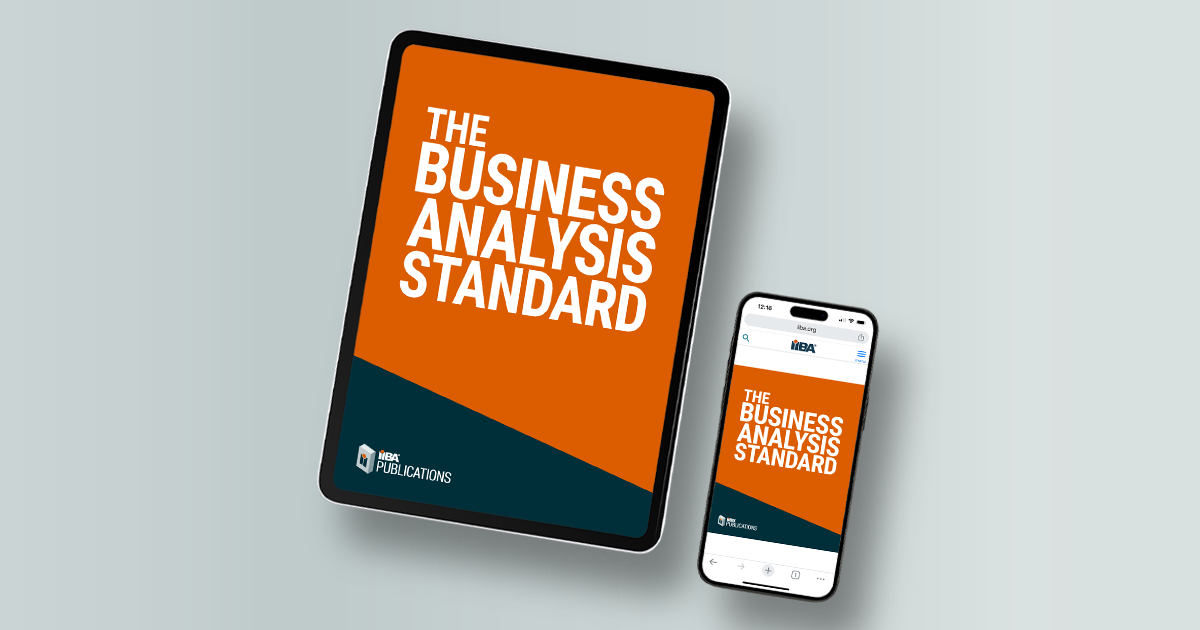Introducing The Business Analysis Standard in Arabic
Disclaimer: The views and opinions expressed in this article are those of the author and may not reflect the perspectives of IIBA.
Receive free IIBA updates and exclusive content!

Did you know that over 400 million people speak Arabic as either a primary or secondary language?
In the ever-expanding landscape of global business analysis, ensuring accessibility to essential professional resources is crucial. To that end, we’re thrilled to introduce the translation of The Business Analysis Standard in Arabic.
The translation of key resources underscores IIBA's dedication to serving the global community. It also emphasizes the pivotal role translated materials play in fostering global collaboration and proficiency in business analysis.
What is the Standard ?
The Business Analysis Standard provides a simplified, inclusive view of business analysis and includes foundational concepts in an easy-to-use format. It delivers a comprehensive view of the foundation for effective business analysis.With the release of the Arabic translation, we’re reaching a broader audience and empowering Arabic-speaking professionals with a resource tailored to their linguistic preferences.
It not only facilitates better understanding but also promotes the adoption of standardized terms and practices, enhancing the effectiveness of business analysis.
Making Analysis More Accessible
Building upon previous translations in languages such as Canadian French, Japanese, Chinese, and Brazilian Portuguese, the addition of Arabic adds to the wealth of resources available to business analysis professionals worldwide.It not only enhances accessibility but also reflects IIBA’s unwavering commitment to supporting the professional development of IIBA members globally. Over the past year, the following translated materials were also released to the community:
- Arabic: BABOK Guide Glossary
- Canadian French: The Business Analysis Standard
- Japanese: The Business Analysis Standard
- Chinese: The Business Analysis Standard
- Spanish: BABOK Guide Glossary
- Brazilian Portuguese: Entry Certificate in Business Analysis (ECBA) exam, The Business Analysis Standard, and Being Nimble
- Ukrainian: BABOK Guide Glossary
Thank You to Our Dedicated Volunteers
The successful translation of the Standard into Arabic wouldn’t have been possible without the invaluable contributions of dedicated volunteers.The IIBA Sudan Chapter played a key role in leading it, showing commitment and dedication to advance the profession of business analysis in Arabic-speaking regions.
The team of translators spanned from a variety of regions, including Saudia Arabia, Jordan, Sudan, Egypt, and the United Arab Emirates. Each of the following volunteers made an impact by ensuring the accuracy and quality of the translated material:
- Elgaili H. Ahmed
- Hussam Mandil
- Mohmmed Ahmed Mohmmed Babikir
- Enes Sapan
- Asma Al Labadi
- Hala Mohamed Ali Imam
- Wael H. Hamad
- Yara Alkhouri
- Ahmed Tagalsir Ibrahim Taha
Volunteering embodies the spirit of community and generosity, showcasing the power of collective action to drive positive change. These volunteers are truly leading change within their communities and moving business analysis forward.
From chapter events to forums that help shape the profession, there are many ways for IIBA members to give back while developing their skills and earning Continuing Development Units (CDUs). If you’re interested in volunteering with the translations team, please connect with us at volunteer@iiba.org.
The Work Is Far from Done
The work of translations is a journey, not a destination. While we celebrate the successful launch of the Standard into Arabic, there’s still much ground to cover.Many key resources still need to be translated into more languages, ensuring professionals worldwide can access essential materials in their preferred languages.
We’re committed to reaching out to underserved communities, bridging the gap, and providing opportunities for growth and development in business analysis. Looking ahead, we’re already planning further translations for this year and beyond.
By continuing to expand our multilingual offerings, we aim to break down barriers and empower professionals from diverse backgrounds to thrive in business analysis. Through more translated materials, global events, and collaborative community efforts, we aim to continue serving the global community and fostering excellence in business analysis across cultural boundaries.
To access your copy of The Business Analysis Standard in Arabic or any other translated language, visit IIBA’s Multilanguage Resources hub.
About the Author

As the Product Manager for Publications and Translations at IIBA, Paul Stapleton showcases his zeal for technical communication. He spearheaded the editorial team behind the BABOK Guide version 3 and the Agile Extension to the BABOK Guide versions 1 and 2. Additionally, Paul led the translation efforts of the BABOK Guide version 3 into seven different languages, including Chinese, Standard French, Canadian French, German, Japanese, Russian, and Portuguese.



